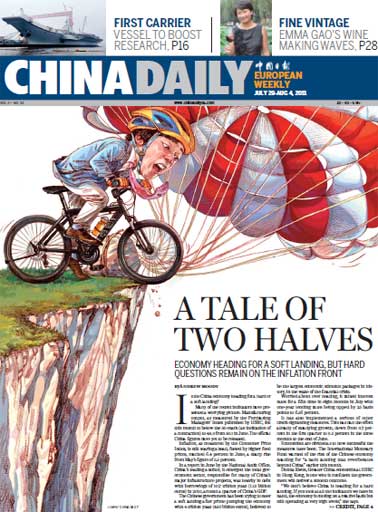The realistic China growth scenario
Updated: 2011-07-29 11:57
By Andrew Moody (China Daily)
Current local government debt levels may have significant impact on economy, says Pettis
Michael Pettis has been the subject of international attention recently for pointing out the risks that China's juggernaut economy could be heading for a hard landing.
The 53-year-old professor of finance at Peking University's Guanghua School of Management struggles with the terms of hard and soft landings, however.
|
 Michael Pettis says the main focus for policymakers in China should be in raising household income and consumption levels. [Geng Feifei/for China Daily] |
The American has been in the spotlight ever since China's National Audit Office published its report putting local government debt at 10.7 trillion yuan (1.15 trillion euros) in 2010 or more than 25 percent of the gross domestic product (GDP).
He has argued in the New York Times and on numerous international TV channels that these debt levels could put a significant brake on China's economic growth.
Pettis, who is in his apartment in the Huaqing Jiayuan complex in the slightly Bohemian Wudaokou area of Beijing, appears a bit world weary from all the attention.
"Yes, I was on the BBC yesterday. CCTV (China Central Television) asks me to go on every week. It is always 7.30 am in the rush hour but they are good friends and I try to do it once a month," he says.
Pettis, a tall languid figure slumped on his large sofa, denies, however, he has been particularly bearish about China.
"I don't really think about it as being bearish. Obviously everyone says that but I think it is a realistic attitude," he says.
The local government borrowing has attracted a lot of international interest because many thought it was the United States and not China that had the debt problem.
"The problem is that we are so US centric. We don't understand anything unless it happens in the US. What we are seeing in the US is rising consumer indebtedness and in China rising producer indebtedness," he says.
Pettis's central argument is that the spending by China's local authorities on major projects such as roads, railways, airports and huge skyscrapers is beginning to catch up with the economy.
He says it is becoming obvious that some of the investment over the past decade has not produced the returns to cover bank loans.
"If you invest $100 (69 euros) in a project that only returns $90, you have a $10 loss. The increase in the economic value is less than the value of the debt. In other words it is a misallocated and wasted investment," he says.
Pettis believes that a very big hard landing for the economy would come only if there was no more money to borrow.
"The only way it ends in a hard landing is that if we keep accumulating debt to the point where we are no longer able to increase the debt level. Once that happens you just switch off the engine," he says.
He says current debt levels are already potentially going to have a significant impact on economic growth in the future.
"What I think we are going to have to get used to is a process of lower highs and lower lows (in terms of growth rates) until the economy stabilizes," he says.
"I think we are going to have to get used to growth rates of as low as 3 percent."
Pettis was born in Spain to an American father, a well-known consultant engineer, and a French mother and was brought up in Pakistan, Peru and Morocco.
After Columbia University in New York, where he initially studied physics but switched to development economics and finance, he embarked on a career as a Wall Street investment banker working for companies like Bear Sterns, where he headed Latin American capital markets.
He came to China on a holiday in 2001 and made the decision to stay.
"I spent a week in the Hilton hotel and it changed my life. It was an exciting place. I decided to come here for two years with the intention of returning to Wall Street but it has been 10 years," he says.
He taught initially at Tsinghua University before taking up his current post at Guanghua School of Management, where he specializes in Chinese financial markets.
Pettis also owns one of Beijing's leading new music venues D-22, in the Wudaokou district, and his own CD label, Maybe Mars, both of which drain his reserves from being a former Wall Street banker.
"The club is now down only about $5,000 to $10,000 a year. It is the label that costs money. Nobody buys CDs but you still have to produce them," he says.
Pettis, who has produced a number of books, including The Volatility Machine about the development of emerging economies, which was also published in Chinese, is now working on another book about the China economy.
He says he is skeptical of some of the books written about China such as When China Rules the World by the British academic and political commentator Martin Jacques.
"This is just hyperventilating. My guess is in 10 years he is going to be very embarrassed by that book. It is a typical non-economist view of economics. You see lots of economic activity and froth and make conclusions about it," he says.
He says many observers of China don't actually understand the full picture of the Chinese economy.
"China analysts have done a good job of describing the landscape outside the window but not many have tried to figure out what makes the train run or where it is going," he says.
Pettis believes for China's economic outlook to improve, the government needs to take urgent steps to reduce the level of investment.
"Basically, what they have to do is reduce misallocated investment but in my opinion almost all investment now is misallocated, particularly if you leave it up to local governments," he says.
Many people in China are fearful of repeating what has happened in Japan over the past 20 years.
Its economy too was heavily dependent on investment in infrastructure projects but suffered a great asset price crash in 1990s and has endured low growth rates ever since.
Pettis argues, however, that this should not be seen as a nightmare scenario since income levels have actually risen in Japan during this time.
"Japan might have been growing for 8 or 9 percent a year from the 1970s onwards but household income was growing much more slowly. Since 1990 incomes have risen and people have felt richer, although if you looked simply at GDP you would say it had been a disaster," he says.
The economist argues the main focus of policymakers in China should be in raising household income and consumption levels and not chasing growth through investment.
"Everybody agrees now that China must rebalance. We all know that consumption has to go up," he says.
He says this is the challenge for China and not to become the biggest economy in the world.
Pettis also doubts the ever-debated forecast by Goldman Sachs that China will become the biggest economy in the world by 2027.
"China will not become the biggest economy in the world in my lifetime. The Goldman Sachs figures are completely wrong. They said the same thing about Japan," he says.
E-paper

Ringing success
Domestic firms make hay as shopping spree by middle class consumers keeps cash registers ringing in Nanjing
Mixed Results
Crowning achievement
Living happily ever after
Specials

Ciao, Yao
Yao Ming announced his retirement from basketball, staging an emotional end to a glorious career.

Going the distance
British fitness coach comes to terms with tragedy through life changes

Turning up the heat
Traditional Chinese medicine using moxa, or mugwort herb, is once again becoming fashionable
